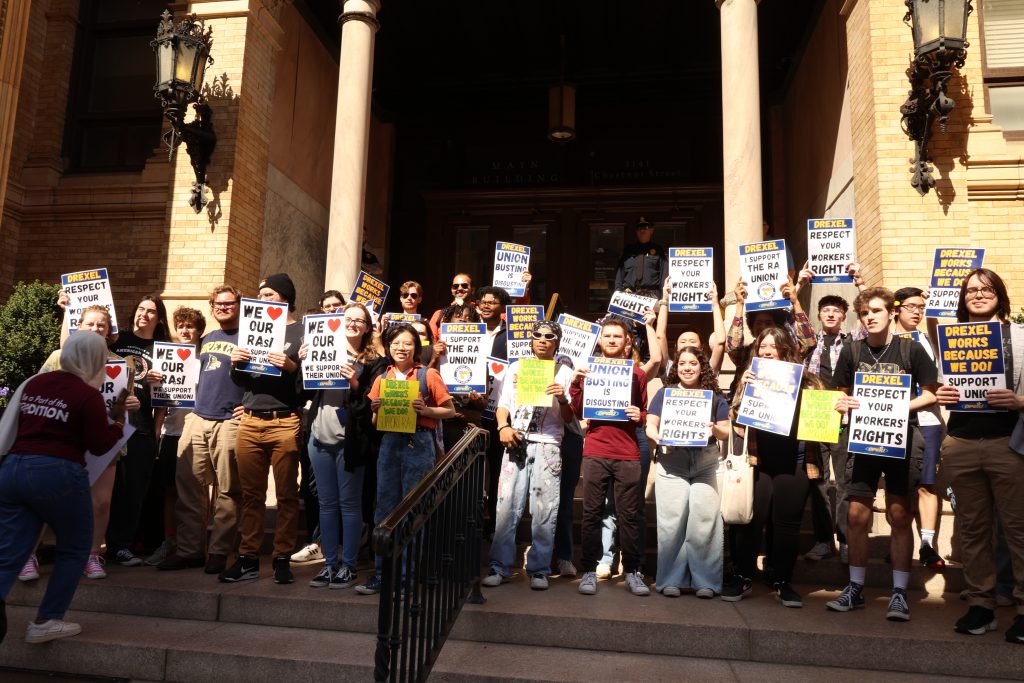
On Monday, March 11, The Triangle reported that resident assistants at Drexel University announced an official petition to form a union. This is the first of several steps to ultimately form the first student employee union at Drexel.
In a previous issue, The Triangle detailed how Drexel treats its student employees as second-class. RAs described how Drexel fails to recognize the time and commitment required to be an RA and lacks transparency around employment practices.
With exhausting duties like unpaid training activities, holiday shifts, showing Public Safety how to run the desk at night, overnight 12-hour shifts on weekdays and 24-hour shifts on weekends staying chained in the residence hall, RAs feel that their current $100 pre-tax monthly stipend and partial meal plan ($355 stipend but no meal plan for Stiles Hall RAs) do not fairly compensate them for what one RA, who asked to remain anonymous fearing employer retaliation, described as an approximately 30-hour work week.
Job security is also a concern because RAs are not guaranteed to have their employment contract renewed each year, which creates uncertainty about their housing situation and livelihood. A union is the only way for RAs and other student employees to secure permanent and meaningful change on these workplace issues.
Unions provide several unique protections for employees. There is strength in numbers, and unions force employers to engage in collective bargaining, which means employees can jointly negotiate for better working conditions without fearing individual repercussions for asking for more . When employers become unreasonable or bargain in bad faith, federal law allows union members to seek relief from the National Labor Relations Board or go on strike. The right to strike is protected by the National Labor Relations Act. Employees facing disciplinary action have the right to have a union representative present at any disciplinary meeting, which ensures that the employer abides by the union contract and does not perform any illegal actions. Pennsylvania does little to provide more than the minimum federal labor protections, which makes unions ever more essential.
Drexel needs to abandon its atrocious anti-union history and voluntarily recognize the proposed RA union. In January 2021, during the coronavirus pandemic, residential desk coordinators at Drexel filed to form a union. Drexel responded by asking the NLRB, the federal agency responsible for regulating union activity, to hold in-person elections as opposed to mail ballots. COVID-19 vaccines were not available to the general public in Pennsylvania until April of that year. According to a professional staff member, who asked to remain anonymous fearing employer retaliation, as a result of Drexel’s vigorous antagonism to unions, the residential desk coordinators voted in-person due to fear of not having their votes counted even though the NLRB decided to provide the option of mail-in ballots. Forcing employees to risk their lives is not the way a caring employer responds to a unionization effort, and it is a shame that employees seriously debated risking the health of themselves and their loved ones to secure better working conditions.
At this stage of the RA unionization process, Drexel has the option to voluntarily recognize the union, and should do so to show respect for its workers’ rights. Amid the backdrop of President John Fry of Drexel being in the top 10 most highly paid US private college presidents and the general sentiment that Drexel has become too corporatized (President Fry is a former management consultant), it is essential for Drexel to show its commitment to its employees. If Drexel truly cares about students’ voices, it would allow its student employees to create a union that represents their voices.
It is also in Drexel’s best interest to voluntarily recognize the union. As of 11 p.m. on March 12, a petition being circulated by the RA union had garnered 367 signatures from current residents, students, alumni and RAs from other institutions. The petition was only created the day before. As public pressure mounts, Drexel will find it increasingly difficult to perform anti-union tactics. The union’s formation also seems inevitable according to a union press release, 80% of RAs support unionization. Only 50% + 1 vote is required for the formation of the union. The union already has the votes. It is simply pointless for Drexel to waste resources attempting to resist the unionization effort, and it would do Drexel favors to begin negotiating in good faith instead of wasting everyone’s time.
A long road lies ahead for the RAs. Unless Drexel voluntarily recognizes the union, the RAs must go through an election process before receiving the honor of being the first student employee union at Drexel. Then the union must negotiate its first contract, which can be a long, arduous process.
All eyes will be on Drexel in what will be a test case for the administration’s willingness to work with student unions, as various other student employee groups consider their own union bids.

